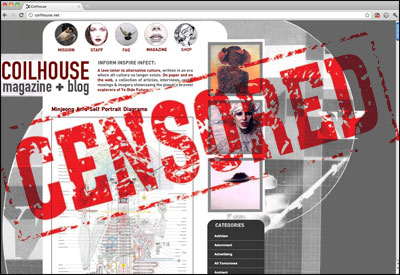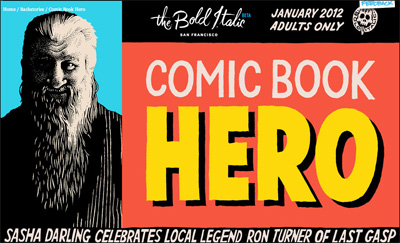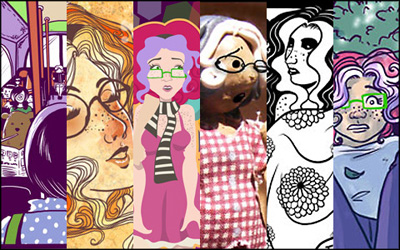
Effective immediately, we’ll be shutting down until midnight tomorrow to protest two pieces of blacklist legislation – PROTECT IP Act (PIPA) in the Senate, and Stop Online Piracy Act (SOPA) in the House.
Over the weekend, we saw several victories against the bills. The Obama administration came out against the DNS blocking in response to the anti-SOPA petition. SOPA author and notorious copyright infringer Rep. Lamar Smith stated on Friday that DNS blocking would be struck from the bill. The Internet may have won these battles, but the war is far from over. Despite earlier reports that SOPA was “shelved” (or, as some might say “indefinitely detained”) over the weekend, Lamar Smith announced today that SOPA markup would resume next month.
SOPA has not gone away. PIPA is still up for a vote on January 24th. It’s time to make our voices heard. Coilhouse will be standing with Wikipedia, the EFF, BoingBoing, Reddit, and sites all over the world.
Coilhouse (and countless other publishers, businesses, and activists) could never thrive in a world where SOPA and PIPA were considered reasonable. We oppose the concept of the MPAA (or any corporate sponsor, for that matter) actually writing legislation. We oppose a room full of politicians who don’t understand how the Internet works making vital judgements about its future.
Some relevant quotes:
“If the ████ SOPA [and PIPA] bill passes, ████████████ we’re all kind of ████ed.” – Marina Galperina
“I’m not by any means an enemy of intellectual property, and in fact keep a roof over my head because the conceptexists. But I think that SOPA as it stands now, or as it stood beforethey paused to think about it, is extremely ill thought out, and abasically crazily Draconian piece of legislation.” – William Gibson
“Our freedom is more important than your dying industry. Period.” – @mikeestee
“It doesn’t get much better than working from a war room dedicated to shutting down Wikipedia.” – overheard by @sfslim at the offices of Wikipedia
“These bills were written by the content industry without any input from the technology industry. And they are trying to fast track them through Congress and into law without any negotiation with the technology industry.” – Fred Wilson (Union Square Ventures)
“When ideas are blocked, information deleted, conversations stifled and people constrained in their choices, the Internet is diminished for all of us. There isn’t an economic Internet and a social Internet and a political Internet. There’s just the Internet.” – Hillary Clinton
“The potential for abuse of power through digital networks – upon which we as citizens now depend for nearly everything, including our politics – is one of the most insidious threats to democracy in the Internet age … This is no time for politicians and industry lobbyists in Washington to be devising new Internet censorship mechanisms, adding new opportunities for abuse of corporate and government power over online speech.” – Rebecca MacKinnon (New York Times)
“We’re furthering our corporate interest by taking down our website + ads, to stop a law that the MPAA says can’t harm us.” – Rob Beschizza in response to MPAA butthurt
When was the last time you saw “The Internet” agree about something? It’s beautiful. Thanks, #SOPA! – @raindrift
Intellectual property theft is a problem for artists, and additional safeguards may be needed. As avant-cellist Zoe Keating tweeted earlier today, “I’m against #SOPA, but meanwhile I’m issuing a 7th, ineffective & useless DMCA against @grooveshark. #devilinthedetails” (Grooveshark is notorious among music streaming sites for refusing to pay artists their fair share.) There are no easy solutions. Whether it’s collaboratively fine-tuning the OPEN Act (and it turns out that Rep. Zoe Lofgren, one of the act’s sponsors and SOPA’s biggest opponents, actually listens to feedback) or working out some other method of protest (perhaps a huge internet campaign to educate fans on which sites most fairly compensate the artists they love?), we can work together to construct an Internet where innovation can thrive and artists can fairly profit their work.
SOPA and PIPA cannot pass. The stats are scary: we currently have only 6 Senators opposing PIPA, and we need 40. Only 12 House Members oppose SOPA, and we need 214.
Get involved. Some tips from Congressman Jared Polis and the EFF:
- Show up at a town hall or talk to them in person, check their schedule with their office.
- Call your Senators and Representative and tell them to oppose Protect-IP and SOPA, respectively. Click here for some suggested talking points. Then tell your friends about the call on social media sites.
- Contact Congress through EFF’s action center. Customize your letter to explain who you are and why you are worried about this bill. If you’re outside the United States, try this petition from Fight for the Future instead.
- Are you an artist? Showcase the dangers of censorship through art and music, and use your art as a way of reaching people who might otherwise not know about this issue. You can make stickers, posters or patches, create a YouTube video, or hold an open-mic night around censorship.
- Write a blog post about the blacklist bills. Whether it’s a candid explanation of why you oppose the legislation, a discussion of the effect on human rights, or a call to filmmakersto protest the blacklist, there are plenty of things to say about this scary legislation. Help us get the word out by writing articles on your own blog, your school blog, or on blogs that take guest contributors.
- If you work for a tech company, approach the leadership at your company and explain to them your concerns. Urge them to join you in speaking out. These companies (PDF) already took a stand.
- More tips available from The EFF.
Together, we will defeat this.












